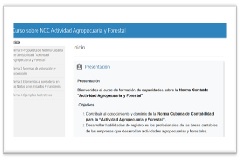Proposal for a training system for the Cuban Standard of Accounting for Agricultural and Forestry Activity
Keywords:
accountingAbstract
Based on the research carried out: "Accounting harmonization of agricultural and forestry activity in the context of the Cuban economy", the proposal for a training system is shown, with the premise of contributing to the adequate and timely implementation of the regulations. proposal. Taking into consideration its complexity and novelty, a work of integration and cooperation is suggested between the Ministry of Finance and Prices, the Ministry of Agriculture and the Sugar Agroindustry Business Group. The objective of this work was: to design a training system for the Cuban Accounting Standard (NCC) Agricultural and Forestry Activity that facilitates the creation and development of capabilities. The training system on the NCC Agricultural and Forestry Activity is developed as a distinctive element, the eXelearning software was used as a tool for the creation and development of capabilities.
References
Arias, J. A. (2019). Uso del exelearning, aplicación de contenidos digitales y su relación con el proceso de aprendizaje en la Universidad Nacional José Faustino Sánchez Carrión 2017. EPIGMALIÓN, 1(2). Retrieved from http://revistas.unjfsc.edu.pe/ind ex.php/EPIGMALION/article/view /540
Cabero, J., & Barroso, J. (2016). The educational possibilities of Augmented Reality. Journal of New Approaches in Educational Research, 5(1), 44-50. doi:https://doi.org/10.7821/naer.20 16.1.140
Cruz, E. A. (2016). Bases metodológicas de la contabilidad gubernamental en el sector gobierno a nivel provincial. (Tesis doctoral).Universidad de Holguín, Holguín,Cuba.
González, A. H., & Vallejo, A. E. (2019). Exelearning: Potencialidades para la creación de REA. I Workshop sobre Prácticas Educativas Abiertas (WPEA). Retrieved from http://sedici.unlp.edu.ar/handle/ 10915/81176
Martí, J., Seguí, D., & Seguí, E. (2019). El uso de la gamificación en la enseñanza del emprendimiento: una revisión de la literatura. En INNODOCT/18. International ConferenceonInnovation, Documentation and Education. Editorial UniversitatPolitècnica de València, (pp. 605-614). Valencia. doi:https://doi.org/10.4995/INN2018 .2018.8818
Morales, M. G. (2013). Bases metodológicas de la contabilidad gubernamental en el sector gobierno a nivel municipal. (Tesis doctoral).Universidad Ignacio Agramonte Loynaz.Camagüey, Cuba.
Moreno, M., López , Y., & Fernández, J. A. (2021). Bases metodológicas para una práctica de campo integradora a través del uso de ExeLearning. MENDIVE, 19(1), 137-151. Retrieved from http://mendive.upr.edu.cu/index.php/MendiveUPR/article/view/2189
Naciones Unidas. (30 de octubre de 2023). Impacto académico. Obtenido de Construyendo capacidades: https://www.un.org/es/impacto-acad%C3%A9mico/construyendo-capacidades
Navarro, A. (2021). Normas contables de instrumentos financieros para el contexto de la economía cubana. (Tesis doctoral).Universidad Ignacio Agramonte Loynaz.Camagüey.Cuba.
Rodríguez, E., Villavicencio, L., Bueno, Y., & Bueno , N. C. (2016). Consideraciones sobre el uso de la herramienta de código abierto exe-learning en el diseño y desarrollo de contenidos multimedia y recursos para el aprendizaje. 7(2), 227-244.
Sebastiá, R., & Tonda, E. M. (2017). La imagen virtual de Andalucía en el mundo: Análisis y evaluación de páginas web. Enseñanza y aprendizaje de la Geografía para el siglo XXI, 201-221. Retrieved from https://dialnet.unirioja.es/servlet /articulo?codigo=5898881

Downloads
Published
How to Cite
Issue
Section
License

This work is licensed under a Creative Commons Attribution-NonCommercial-NoDerivatives 4.0 International License.
- Sending a contribution to the Cuban Magazine of Finance and Prices (RCFP) implies a non-exclusive assignment of rights, which includes: Reproduce the Article in whole or in part and communicate the Article to the public in print or electronic format, combined or not with the works of third parties, such as by making the Article available to the public via the Internet or any other network, as part of a database, with on-line or off-line access, for use by third parties; Translate the Article into other languages and release the translation to the public; Create adaptations, summaries, or excerpts of the Article and other derivative works thereof, and exercise all of your rights in such adaptations, summaries, excerpts, and derivative works; Include the Article, either in its translated, adapted or summarized version, totally or partially, in a computerized database and make it available to third parties; Include the Article, totally or partially, either in its translated, adapted or summarized version, in a selection or compilation of texts; Rent or lend the Item to third parties; Reproduce the Article by means of reprography, without prejudice to legal limitations.
The Author of articles published in the Cuban Magazine of Finance and Prices (RCFP) may exercise the following rights:
- Reproduce the Article, totally or partially, and disseminate its content or make it available to the public, in printed or electronic format, as part of a teaching content or as a compilation, for use in the academic or research field in the institution to the one to which the Author belongs or in those institutions to which he belongs.
- Publish the Article on the Internet or authorize the Author's institution (or any other appropriate organization) to do the same, immediately from the date of publication of the Article in the journal: within the institution's closed network (p. eg, the intranet); or in publicly accessible institutional repositories or centrally organized repositories, provided that a link to the Article is included on the journal's website.
- Grant to the Author's own institution (or any other appropriate organization) the authorization to reproduce the Article in order to prevent its deterioration or, if the original is in an obsolete format or the technology to use it is not available, in order to ensure that the Article remains available for teaching or research purposes;
- Present the Article at a meeting or conference, and distribute copies of the Article to those attending the event.
- Grant end users at the Author's own institution (or any other appropriate organization) permission to copy, use, transmit, and publicly perform the work and to create and distribute derivative works.



